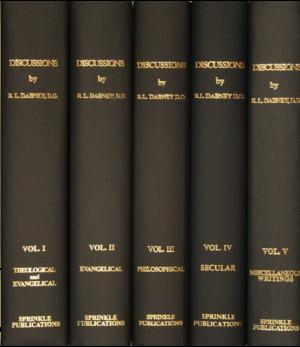
The great Southern Presbyterian theologian Robert Lewis Dabney has been mentioned a number of times on this site. It is a very telling indication of our times that such a visionary man is so little known, and usually slandered when mentioned at all. You can find the entire collection of his written works at the Dabney Archive, all of which are well worth reading. However, such a massive undertaking can be a bit overwhelming, and so on Sundays I will post bite-sized excerpts from Dabney’s works, with perhaps a little bit of my own commentary. This will be done in hopes of promoting wider readership for this great man. You can find links to all the previous “Dabney on Sunday” posts at the bottom of this post.
The following excerpt is taken from Dabney’s article which appeared in The Central Presbyterian (November-December 1867), entitled “A Mother’s Crowning Glory.” The article can be found among the “Secular Topics” section of volume 5 in his Discussions, p. 373. Dabney continues to discuss the “ornament of a meek and quiet spirit” characteristic of the Virginian mother:
Let us now briefly glance at one of the sources of this character of the Virginia lady. The prime source of its peculiar excellencies was the Bible and its influences. The peculiarity of the religion of the generation which is now passing away, was its scriptural source. Books were few; and it was rare that any book was read, which had not come from the hand of a great master. This ill-starred activity of the press was then unknown, which has now flooded the land with a tide of mediocrity and published stupidity or folly. Nothing less than a national reputation, such as that of a Newton or Bunyan, was then likely to gain a place for a religious book in the library of a cultivated Christian family. There was no Sunday School Union—a good thing so largely and unhappily perverted—to trade the infant novel reader, by its pitiful religious fictions. Hence, the religious ideas and sentiments imbibed came chiefly from the Word of God, and were of a healthy and vigorous type. The absence of excess, and of unhealthy religious dissipations in the home life of the country, the routine of innocent occupations and ennobling duties, with the deeply fixed habits of devotion which prevailed, gave to the Christianity of that day a depth and purity, which, we fear, is seldom seen now.
Another molding influence of the character we have described was home education. We do not mean by this that there were no schools other than day schools; or that the literary culture was inferior to that now enjoyed.—Schools were indeed smaller, and the boarding school was but another home, not large enough, nor public enough to have lost its domestic character. That affair, so often the nuisance of our day—a “female college,” (by which we have to “guess,” the Yankee progressive intends, not what he says, viz: a college which is itself endued with the attribute of sex, but a college for females,) was then happily unknown. Seminaries for young ladies were what they ever should be—private schools, where the girl, removed from her own house, was trained in letters, manners, and piety by a matron who was truly another parent, amidst the privacy and home influences appropriate to the elevation and delicacy of the female character. In these or the private schools at or near their own homes, our mothers were carried over less extent of nominal studies; but they were more thoroughly grounded in those they undertook. And if we may estimate the result of education by that which should be its true test, the training of the mind and heart for the true appreciation and enjoyment of their proper food, then they were educated women. Especially did they possess this invaluable result of mental culture, which the more shallow and glittering education of our day fails so often to confer, a taste for good reading. They pretended perhaps, to few accomplishments, but they were fit associates and equals for noble and cultivated men, and not unprepared to join in any high argument of statesmanship, or theology, or practical affairs, into which they entered.
Previous Dabney on Sundays:
Universal Suffrage
Abstractions
Redefining Terms
False Philosophies
Abolishing Religion
Cruelty of Humanitarian Philanthropy
Southern Slavery
Labor Unions
Secularized Education
Patriotism
Preaching, Part 1, Part 2, Part 3
Doctrinal Confessions, Part 1, Part 2, Part 3, Part 4, Part 5, Part 6
Divine Justice, Part 1, Part 2, Part 3, Part 4, Part 5
The African Slave Trade
Religious Selfishness
Women Preachers, Part 1, Part 2. Part 3, Part 4, Part 5, Part 6
Dangerous Literature, Part 1, Part 2, Part 3, Part 4
Spurious Religious Feelings, Part 1, Part 2, Part 3, Part 4
Political Slavery
The Virginia Matron, Part 1
| Tweet |
|
|
|




